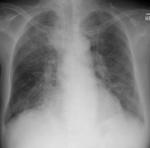World Pneumonia Day 2009
 Today is World Pneumonia Day 2009. Every day, 4000 children die from pneumonia in Haiti and other countries throughout the developing world. This is more than HIV/AIDS, measles, and malaria combined. Despite that, it has not been a global health priority. This could change as there is more attention being given this preventable and treatable disease. While there is no single magic bullet, there are a series of proven interventions that, if scaled up, would protect and promote the health of children around the world. Click here to learn which organizations participated in World Pneumonia Day 2009 and here to learn how you can be a part of the global fight against pneumonia, not just for one day, but throughout the year.
Today is World Pneumonia Day 2009. Every day, 4000 children die from pneumonia in Haiti and other countries throughout the developing world. This is more than HIV/AIDS, measles, and malaria combined. Despite that, it has not been a global health priority. This could change as there is more attention being given this preventable and treatable disease. While there is no single magic bullet, there are a series of proven interventions that, if scaled up, would protect and promote the health of children around the world. Click here to learn which organizations participated in World Pneumonia Day 2009 and here to learn how you can be a part of the global fight against pneumonia, not just for one day, but throughout the year.
If we are going to discuss pneumonia, let's first define it. Pneumonia is an infection of the lungs that causes fever, coughing, and difficulty in breathing. It can be caused by viruses, fungii, or bacteria. Bacteria such as Haemophilus influenzae type B (Hib) and pneumococcus are estimated to cause more than 50% of pneumonia deaths in children under 5 years of age. Children under five in are most at risk, particularly those who are malnourished, live in unhygienic conditions, are exposed to indoor air pollution, and lack access to heath care.
On November 2, nearly 100 leading global health organizations from around the world joined forces to recognize the first annual World Pneumonia Day and urge all governments to take steps to fight pneumonia. The World Health Organization and the UN Childrens Fund (UNICEF) released a lobal strategic plan to prevent and respond to pneumonia called the Global Action Plan for the Prevention and Control of Pneumonia (GAPP). The GAPP, which is attached, focuses on the 68 highest buden countries and emphasizes a three-pronged pneumonia control strategy which: (1) protects children by promoting exclusive breastfeeding and ensuring adequate nutrition and good hygiene; (2) prevents the disease by vaccinating them against common causes of pneumonia such as Streptococcus pneumoniae (pneumococcal disease) and Haemophilus influenzae type b (Hib); and (3) treats children at the community level and in clinics and hospitals through effective case management including antibiotics. If fully funded, the GAPP projects significant declines in sickness and deaths from pneumonia by 2015. That is, not coincidentally, the final year of the Millenium Development Goals. Simply put, meeting the Fourth Millenium Goal on reducing child mortality will not be possible without progress against pneumonia.
A quick word is needed about the Global Alliance on Vaccines and Interventions (GAVI). Launched in 2000, the GAVI Alliance is a global health partnership representing stakeholders in immunisation from both private and public sectors: developing world and donor governments, private sector philanthropists such as the Bill & Melinda Gates Foundation, the financial community, developed and developing country vaccine manufacturers, research and technical institutes, civil society organisations and multilateral organisations like WHO, UNICEF, and the World Bank. Thanks to GAVI, more and more countries have access to vacinnes that prevent pneumonia and other diseases. GAVI has provided funding for introcuding Hib vaccines in 59 countries with impressive results.
Some day we may see the same progress in Haiti. This is an important issue for the health of Haitian children. In 2000, 40,183 children under five were diagnosed as having pneumonia. Of these, 2,987 (7.4%) died. This compares to 0.7% in the United States, 2.3% in Cuba, and 3.2% in the Dominican Republic. Going forward, the Haitian government should create and articulate a plan, donors should provide resources to support its implementation, while international and non governmental organizations are well placed to build the capacity of the government and communities. Activities to prevent pneumonia will complement other programs well, particularly concerning nutrition, hygiene, and exclusive breastfeeding. Infants who are exclusively breastfed for the first six months of life (no water, tea, food, etc.) are at least 23% less likely to contract pneumonia. This is just one example of a cost effective, high impact intervention that would protect not just against pneumonia, but also against diarrhea and other diseases.
Pneumonia is a disease that preys on the most vulnerable amongst us. But it need not be this way. We can prevent and treat pneumonia with proven interventions. We have the knowledge but must now generate the commitment. May World Pneumonia Day help bring about the attention, resources, and political will to protect the health of children in Haiti and around the world.
Thanks!
Bryan
Add new comment